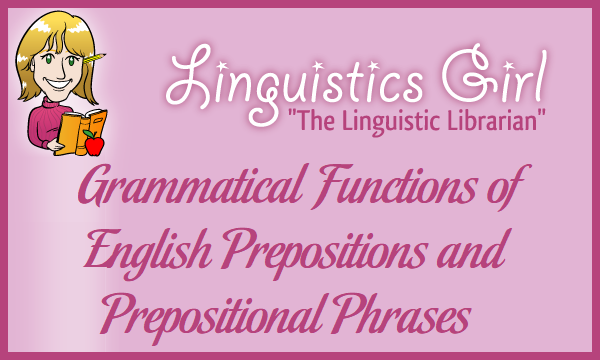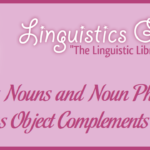Traditional grammars define prepositions as words that “link to other words, phrases, and clauses” and that “express spatial or temporal relations.” Prepositional phrases are phrases that consist of a preposition plus another word, phrase, or clause functioning as a prepositional complement. Prepositions and prepositional phrase perform six primary grammatical functions within sentences in the English language. The seven primary functions of prepositions and prepositional phrases are:
- Prepositional phrase head
- Noun phrase modifier
- Adjective phrase complement
- Verb phrase complement
- Adjunct adverbial
- Disjunct adverbial
The following sections explain and exemplify the seven prototypical functions of prepositions and prepositional phrases in the English language.
Prepositional Phrase Heads
The first prototypical grammatical function that prepositions perform is the prepositional phrase head. A prepositional phrase consists of a preposition plus another phrase or clause that functions as the prepositional complement. For example, the following italicized prepositions function as prepositional phrase heads:
- in the library
- after reading the book
- for whatever will repair the leak
Noun Phrase Modifiers
The second prototypical grammatical function that prepositional phrases perform is the noun phrase modifier. A noun phrase modifier is a word, phrase, or clause that modifies or describes a noun including a noun phrase. For example, the following italicized prepositional phrases function as noun phrase modifiers:
- the puppy with the blue and white fur
- an old man with glasses
- someone for whom the bell tolls
- passion for reading
- love of the game
- fear of flying
Adjective Phrase Complement
The third prototypical grammatical function that prepositional phrases perform is the adjective phrase complement. An adjective phrase complement is a word, phrase, or clause that completes the meaning of an adjective phrase. For example, the following italicized prepositional phrases function as adjective phrase complements:
- fond of bananas
- afraid of falling down the stairs
- aware of the dire consequences
Verb Phrase Complement
The fourth prototypical grammatical function that prepositional phrases perform is the verb phrase complement. A verb phrase complement is a word, phrase, or clause that completes the meaning of a verb phrase. For example, the following italicized prepositional phrases function as verb phrase complements:
- rely on my husband
- listen to the music
- approve of my plan
A verb with a verb phrase complement is often referred to as a prepositional verb. Prepositional verbs are a common verb form in the English language that consist of a verb followed by a preposition.
Adjunct Adverbial
The fifth prototypical grammatical function that prepositional phrases perform is the adjunct adverbial. An adjunct adverbial is a word, phrase, or clause that modifies an entire clause by providing additional information about time, place, manner, condition, purpose, reason, result, and concession. For example, the following italicized prepositional phrases function as adjunct adverbials:
- The children waited in line.
- The couple is walking their dog along the beach.
- She failed the test because of her illness.
Note that indirect objects in ditransitive constructions can move into a prepositional phrase headed by the preposition to or for. However, to– or for-prepositional phrases function as adjunct adverbials, not indirect objects. For example:
- She gave the cat a bath. -> She gave a bath to the cat.
- My husband bought me some chocolates. -> My husband bought some chocolates for me.
- The company sent its customers a coupon. -> The company sent a coupon to its customers.
Disjunct Adverbial
The sixth prototypical grammatical function that prepositional phrases perform is the disjunct adverbial. A disjunct adverbial provides additional information to frame an entire clause. For example, the following italicized prepositional phrases function as disjunct adverbials:
- In my opinion, learning about grammar is fun.
- For the love of goodness, the children need to stop whining.
- With all due respect, you need to calm down.
The six prototypical functions of prepositions and prepositional phrases in English are prepositional phrase heads, noun phrase modifiers, adjective phrase complements, verb phrase complements, adjunct adverbials, and disjunct adverbials.
See also Nominal Functions of English Prepositions and Prepositional Phrases.
References
Brinton, Laurel J. & Donna M. Brinton. 2010. The linguistic structure of Modern English, 2nd edn. Amsterdam: John Benjamins Publishing Company.
DeCarrico, Jeanette S. 2000. The Structure of English: Studies in form and function for language teaching. Ann Arbor: University of Michigan Press.
Hopper, Paul J. 1999. A short course in grammar. New York: W. W. Norton & Company.
Huddleston, Rodney. 1984. Introduction to the grammar of English. Cambridge: Cambridge University Press.
Jacobs, Roderick A. 1995. English syntax: A grammar for English language professionals. New York: Oxford University Press.
Justice, Laura M. and Helen K. Ezell. 2002. The syntax handbook: Everything you learned about syntax…but forgot. Eau Claire, Wisconsin: Thinking Publications.
O’Dwyer, Bernard. 2000. Modern English structures: Form, function, and position. Peterborough, Ontario: Broadview Press.



